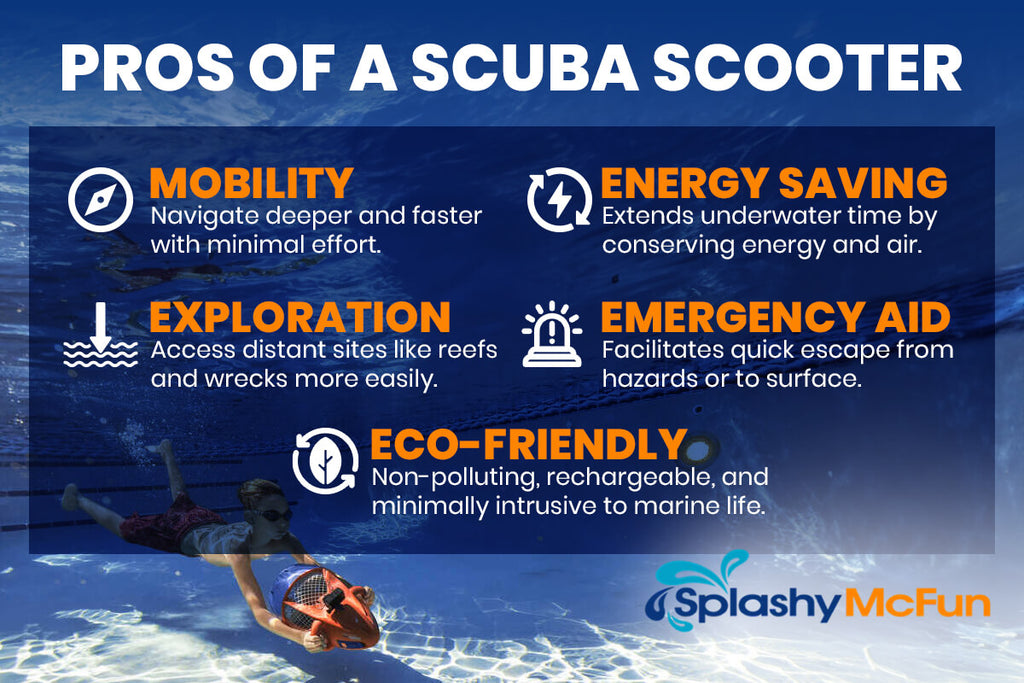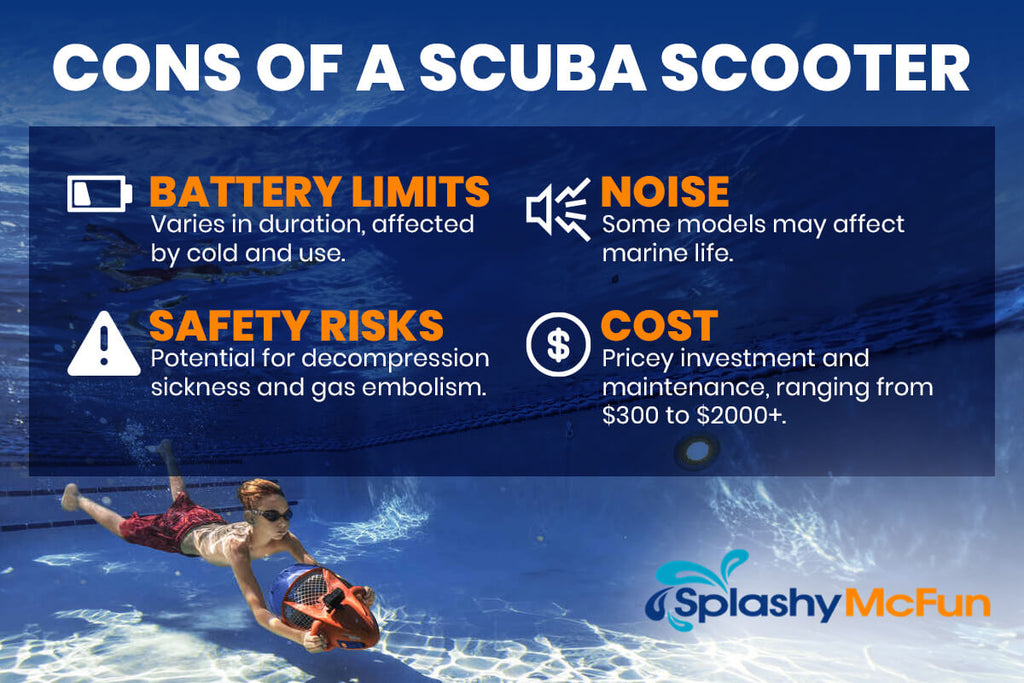Main Menu
Paddle Sports
Boating & Swimming
Inflatable Boats
Ice Eaters &. Fountains
Pros and Cons of a Scuba Scooter
by Ringo Ladue March 19, 2024 5 min read

Pros and Cons of a Scuba Scooter
Have you ever imagined swimming fast but not getting tired? Imagine exploring on top of a coral reef or checking out shipwrecks without oxygen levels depleting quickly. It's possible with an underwater scooter.
This article discusses scuba scooters' strong and weak qualities and how to choose the best one to meet your needs. It provides relevant information to divers who will have the opportunity to explore more of the ocean with a minimal level of effort. Keep reading to find out how to pick the right scuba scooter for your needs.
What is a Scuba Scooter?
The underwater scooter, also known as the scuba scooter or a Diver Propulsion Vehicle, is a battery-powered watercraft that propels you through the water. It’s valuable to various applications tailored specifically around water activities, like snorkeling, diving, and even water play. These scooters can reach speeds of up to 9 miles per hour.
Pros of Scuba Scooters

Scuba scooters provide benefits that greatly enhance the diving experience:
Increased Mobility
Underwater scooters help you explore with less effort. These water scooters have different speeds. The better ones can reach speeds of 5-7mph. The fastest ones move up to 9 mph, while simpler ones move at 1 to 2.5 miles per hour (1.6 to 4 kilometers per hour).
The range of a scuba scooter depends on the model. Some models can cover distances ranging from 23 to 46 nautical miles on a single charge. Then there is the distance, which can differ depending on the diver's level, ocean currents, and underwater environment.
Conservation of Energy
Using a scuba scooter helps you move faster in the water without getting tired. It saves your energy and the air in your diving tank so that you can stay underwater longer. Scooters are useful for diving in hard places, like where the water moves strongly.
Because you're not working hard to swim, you won't use as much air so that you can explore underwater for more time. Remember to dive safely: don't go too deep, and take breaks to avoid getting sick from rising too fast to the surface.
Exploration Opportunities
Using a scooter makes underwater exploring easy and quick. For enjoyable dives, easily reach interesting destinations like coral reefs or shipwrecks with minimal swimming. You see more in less time. For work, like fixing cables or finding things, a scooter makes it faster. So, diving for fun or work, you can see more or do more jobs with less work.
Safety Considerations
Scuba scooters can help in emergencies under the water. If a diver gets into trouble, like being caught in strong water or running out of air, the scooter can quickly take them to safety. If someone is hurt or sick, the scooter can get them to the top fast for help. Also, if the weather changes suddenly or a storm comes, a scooter can help you quickly get back up, away from danger.
Cons of Scuba Scooters

Scuba scooters are really helpful, but they also have some downsides:
Battery Life and Efficiency
The life of an underwater scooter's battery changes based on its kind and how you use it. Typically, scooters operate for about an hour on a single charge. But, the more expensive ones can go for up to 4 hours. The battery might only work well over time if you use the scooter a little. Note that cold water can cause the battery to weaken, but with proper care and storage, you can keep the battery working better for longer.
Noise
Underwater noises from human activities can be very loud, sometimes reaching up to 157 decibels underwater. This means loud noises can harm marine life, including, believe it or not, plants that require a quiet environment to stay healthy and anchored.
As awareness grows, some underwater equipment is being made to be quieter, aiming to reduce harm to the ocean. When choosing underwater gear, it's better to pick ones that make less noise to help protect marine environments.
Safety Concerns
Underwater scooters come with several safety concerns. For instance, they can quickly make divers surface from a deep dive, which may result in DCS or AGE.
DCS, or Decompression Sickness, happens when bubbles form in your body if you go up too fast. AGE, or Arterial Gas Embolism, happens when a bubble gets into your blood and stops it from flowing. Both can be very dangerous and sometimes even deadly.
Cost
Although buying good quality is not cheap, this investment is worthwhile. Continuous repair, fixing, and safety checks accumulate over time so it is important to choose a quality model. Prices start at a few hundred dollars and can go beyond a few thousand. The lower-priced models cost around $300 and $500.
Some scuba scooters with many features can cost between $1,000 and $2,000 or even more. If you use it often, this might seem good for better diving. But if you are just going on a short vacation, especially if it is something you rarely use, it may not feel worth the price.
How to Pick the Best Underwater Scooter
- Depth: Get a scooter that can dive as deep as you plan. Deeper-capable scooters are usually better and safer.
- Power and Battery: Pick one with a long-lasting battery and good power. It should last at least 45 minutes, but longer-lasting batteries are safer to avoid being stranded.
- Portability: A lighter scooter is easier to carry and travel with. A travel case is nice too.
- Cost: Prices range widely. More expensive means longer battery life and deeper dives. A cheaper version might be fine for casual use but ensure its reliability.
Conclusion
With scuba scooters, divers can travel farther and see more underwater without expending too much energy or air. It’s good for accessing remote areas and seeing more in a single dive. On the contrary, they have disadvantages such as battery and price.
The choice of an ideal scooter depends on its intended use, the depth of the intended diving, and the budget available for purchase. With this, the big ocean becomes smaller, making it possible to fulfill people’s desire to explore more of the underwater world with minimal effort.
Explore more underwater with our ScubaJet, Nautica Marine, and Asiwo Sea Scooters. Choose your perfect match and dive into adventure. Shop now!
You can download this article here: Download
- 13 Best Underwater Scooters in 2024 (pdf)
- Underwater Scooters: Everything You Need to Know (Download) (Brochure) (Infographic)
- What to Look for When Buying a Sea Scooter (Download) (Brochure) (Infographic)
- Are Sea Scooters Worth It
- 7 Tips for Choosing the Best Sea Scooter (Download) (Brochure) (Infographic)
- What to Look Out For When Buying Sea Scooters (PDF)
- Ultimate Guide to Buying the Best Underwater Scooter (PDF)(Update)
- Sea Scooter Buyers Guide Infographic
- Underwater Scooters: 7 Reasons Why You Should Get One (Download) (Brochure) (Infographic)
- The Sea Scooter: What Is It, and Why Do I Need One? (PDF)(Update)(Infographic)
- Yamaha Sea Scooter Owners Manual and Buyers Guide
- Water Scooters - All You Need To Know (Download)
Leave a comment
Comments will be approved before showing up.
Subscribe
Sign up to get the latest on sales, new releases and more …
